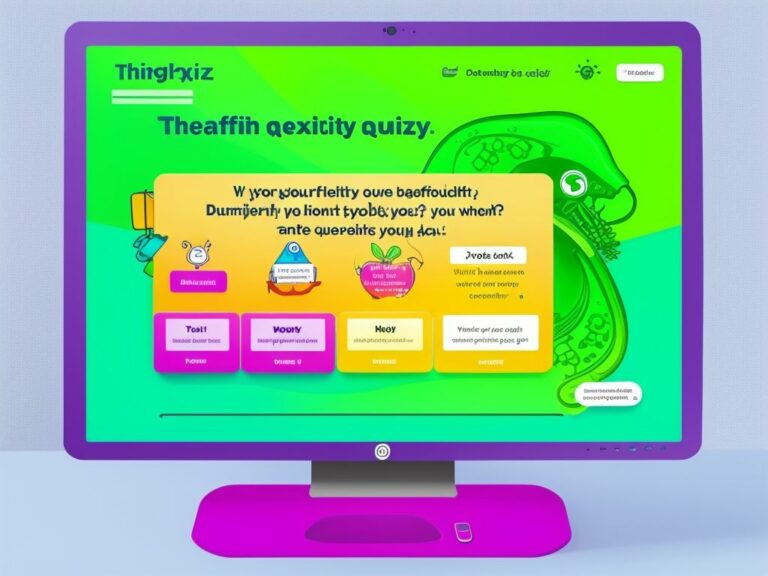How to Design an Anger Issues SelfCheck Quiz
Anger issues can have a significant impact on our well-being and relationships. Designing an anger issues self-check quiz can be a valuable tool in assessing and addressing these concerns. By understanding anger issues, recognizing the importance of self-check quizzes, and following a step-by-step guide, you can create an effective assessment tool.
Understanding Anger Issues: Anger issues refer to difficulties in managing and expressing anger in a healthy and constructive manner. It can lead to negative consequences in various aspects of life, including personal relationships, work, and overall emotional well-being.
The Importance of Self-Check Quizzes: Self-check quizzes provide individuals with an opportunity to evaluate their own anger issues objectively. They can help raise self-awareness, identify potential triggers and patterns, and serve as an initial step towards seeking appropriate help if needed.
Step-by-Step Guide to Designing an Anger Issues Self-Check Quiz: To create an effective anger issues self-check quiz, follow these steps:
- Determine the Purpose and Target Audience of the Quiz: Define the goal of the quiz, whether it is for personal reflection or for a specific group.
- Identify Relevant Anger Issues: Research and identify common anger issues and symptoms that individuals may experience.
- Create Well-Structured Questions: Craft clear and concise questions that cover various aspects of anger, such as triggers, intensity, duration, and coping strategies. Utilize different question formats, including multiple-choice, Likert scale, and open-ended questions.
- Assign Appropriate Scores or Rating Scale: Develop a scoring system or rating scale to help individuals assess the severity or frequency of their anger issues.
- Provide Clear Instructions and Background Information: Clearly explain the purpose of the quiz, how to answer the questions, and any background information that may be helpful.
- Organize the Quiz Layout: Ensure the quiz is visually appealing and user-friendly. Use headings, sections, and logical flow to guide individuals through the assessment.
- Test and Refine the Quiz: Test the quiz with a small sample group and gather feedback to make necessary improvements before making it publicly available.
Guidelines for Effective Anger Issues Self-Check Quizzes: In addition to the design process, consider the following guidelines for creating an effective anger issues self-check quiz:
- Keep the Quiz Short and Concise: Avoid overwhelming participants with too many questions or complicated language. Keep the quiz focused and easily digestible.
- Use Clear and Simple Language: Use plain language that is easy to understand, avoiding jargon or technical terms.
- Avoid Biased or Leading Questions: Ensure the questions are neutral and unbiased to avoid influencing responses.
- Provide Helpful Resources and Recommendations: Include additional resources, tips, or recommendations for managing anger issues and seeking further assistance if necessary.
- Encourage Professional Help or Guidance: Emphasize that self-check quizzes are not a substitute for professional advice. Encourage individuals to seek professional help if they need further support in managing their anger issues.
By following these steps and guidelines, you can design an anger issues self-check quiz that helps individuals gain valuable insights into their anger patterns and take proactive steps towards managing their anger effectively.
Key takeaway:
- Understanding Anger Issues: Before designing a self-check quiz, it’s crucial to have a deep understanding of anger issues and their various manifestations.
- Step-by-Step Guide to Designing: Designing an effective self-check quiz involves identifying the purpose, target audience, relevant anger issues, creating well-structured questions, assigning appropriate scores, and providing clear instructions and background information.
- Guidelines for Effective Quizzes: To ensure the effectiveness of an anger issues self-check quiz, it’s important to keep it concise, use clear and simple language, avoid biased or leading questions, provide helpful resources and recommendations, and encourage seeking professional help or guidance.
Understanding Anger Issues
Understanding anger issues is paramount when it comes to effectively managing and addressing them. Here are some essential points to consider while seeking to comprehend anger issues:
1. Recognize Triggers: It is crucial to identify the situations, individuals, or events that have a tendency to provoke anger.
2. Understand the Impact: Take time to reflect on how anger influences your thoughts, emotions, and relationships.
3. Explore Underlying Causes: It is important to delve into past experiences, unresolved conflicts, or unmet needs that contribute to anger.
4. Develop Coping Strategies: Learn various techniques that can help you manage and express anger in a healthy and constructive manner.
5. Seek Support: Consider consulting with a therapist or joining anger management programs to acquire further insights and guidance in understanding and addressing anger issues.
The Importance of Self-Check Quizzes
The Importance of Self-Check Quizzes
Self-check quizzes play a significant role in personal growth and development. They are crucial for individuals to assess their own emotional well-being and identify areas that may require improvement. Here are some reasons why self-check quizzes are important:
- Self-awareness: The Importance of Self-Check Quizzes lies in helping individuals gain insights into their thoughts, emotions, and behaviors.
- Early intervention: Identifying potential issues early on can prevent them from escalating into bigger problems, thus highlighting the importance of self-check quizzes.
- Empowerment: Self-check quizzes give individuals a sense of control over their own mental health, emphasizing their importance.
- Accountability: The Importance of Self-Check Quizzes is evident in how regular self-assessment encourages individuals to take responsibility for their emotional well-being.
- Customization: Quizzes can be tailored to address specific concerns or issues that an individual may be facing, adding to their importance.
Step-by-Step Guide to Designing an Anger Issues Self-Check Quiz
Designing an Anger Issues Self-Check Quiz doesn’t have to be overwhelming. Let’s break it down step-by-step. First, we’ll determine the purpose and target audience of the quiz. Then, we’ll identify the relevant anger issues to cover. By creating well-structured questions and assigning appropriate scores or rating scales, we can ensure accurate results. Clear instructions and background information will guide participants. Organizing the quiz layout in a logical and user-friendly way is crucial. Testing and refining the quiz will fine-tune its effectiveness. Ready? Let’s dive in!
Determine the Purpose and Target Audience of the Quiz
Determining the purpose and target audience of a self-check quiz for anger issues is essential to ensure its effectiveness. It is important to decide whether the quiz aims to educate, raise awareness, or provide self-assessment for individuals dealing with anger issues. Additionally, it is crucial to determine who the quiz is intended for, such as teenagers, adults, or specific groups like veterans or students. A real-life example showcases the significance of this process: a school counselor developed a quiz specifically for teenagers to help them identify and manage their anger. This targeted approach proved successful as it provided valuable insights and resources for those struggling with anger issues.
Identify Relevant Anger Issues
When designing an anger issues self-check quiz, it is essential to identify relevant anger issues. This involves understanding the common triggers and manifestations of anger in individuals. By incorporating questions that address these specific issues, the quiz can accurately assess a person’s anger management skills. Some examples of relevant anger issues include difficulty controlling anger in relationships, workplace anger, or anger triggered by specific events. Identification of these relevant anger issues ensures that the self-check quiz provides personalized and effective results for individuals seeking to understand and manage their anger better.
Create Well-Structured Questions
When creating an anger issues self-check quiz, it is crucial to design well-structured questions. This ensures that the quiz effectively evaluates an individual’s anger-related challenges. Here are some steps to follow:
- Craft Multiple-Choice Questions: Create questions with clear options to choose from, covering various aspects of anger issues.
- Use Likert Scale Questions: Implement a scale to measure the intensity of anger, enabling participants to express their emotions.
- Include Open-Ended Questions: Incorporate some open-ended questions for participants to provide detailed explanations or examples.
- Determine Appropriate Scores: Assign a scoring system to each question to assess the severity or frequency of anger issues.
By developing well-structured questions, the self-check quiz can accurately assess an individual’s anger-related challenges.
Assign Appropriate Scores or Rating Scale
Assigning appropriate scores or rating scales is essential when designing an anger issues self-check quiz. This is because it helps accurately assess the severity of an individual’s anger problems. Here is a list that highlights the significance of assigning appropriate scores or rating scales:
| 1. Objectivity: Scores or rating scales provide an objective measurement of anger issues, ensuring consistency in evaluating different individuals. |
| 2. Quantification: Assigning scores allows for quantifying the intensity or frequency of anger episodes, providing a clearer understanding of the problem’s severity. |
| 3. Tracking Progress: By utilizing a rating scale, individuals can track their progress over time, noting any improvements or regression. |
| 4. Treatment Strategy: Scores help professionals determine the most suitable treatment strategy based on the severity indicated by the ratings. |
| 5. Comparisons: Assigning scores enables individuals to compare their results with established benchmarks or norms, fostering self-awareness and motivation for change. |
Provide Clear Instructions and Background Information
When designing a self-check quiz to assess anger issues, it is crucial to incorporate and provide clear instructions and background information to ensure accurate and meaningful results.
- Instructions: It is essential to clearly state the purpose of the quiz, explain how to answer the questions, and inform the quiz taker about what they can expect throughout the quiz.
- Background information: Relevant and comprehensive information about anger issues, including their causes, symptoms, and potential consequences, should be incorporated to provide a comprehensive understanding.
- Education: To enhance the quiz taker’s knowledge about managing anger, it is beneficial to include helpful resources like articles, books, or websites where they can find additional information.
- Support: It is important to offer recommendations for individuals struggling with anger issues, including seeking professional help or guidance to ensure they receive the support they need.
Fact: Extensive research has demonstrated that individuals who are presented with clear instructions and background information before taking a self-check quiz are more likely to actively engage in the assessment process and obtain accurate results.
Organize the Quiz Layout
To ensure clarity and ease of use for participants, organizing the layout of an anger issues self-check quiz is crucial.
- Consider the flow: Organize the questions in a logical order that allows participants to progress smoothly.
- Use consistent formatting: Maintain a consistent layout, font size, and style to create a visually appealing quiz.
- Separate sections: Divide the quiz into sections or pages to prevent overwhelming participants.
- Provide clear instructions: Clearly explain how to answer each question and navigate through the quiz.
- Include progress indicators: Display a progress bar or a page count to inform participants of their progress.
- Include navigation buttons: Add clear and intuitive buttons to navigate between questions or sections.
Test and Refine the Quiz
Once you have designed an anger issues self-check quiz, it is crucial to test and refine it to ensure its effectiveness. Here are the steps to test and refine the quiz:
To learn how to design an anger issues self-check quiz, visit this helpful guide.
- Test and Refine the Quiz: Administer the quiz to a sample group to evaluate its clarity and understandability.
- Analyze the responses and identify any problematic questions or areas where improvements can be made.
- Modify the quiz based on the feedback received, ensuring that questions are clear, concise, and unbiased.
- Pilot test the revised quiz with a new sample group to assess its validity and reliability.
- Review the results and make any necessary adjustments to enhance the quiz’s accuracy and relevance.
- Repeat test and refinement process until the quiz consistently produces reliable and meaningful results.
By carefully testing and refining the quiz, you can ensure that it accurately assesses and provides valuable insights into an individual’s anger issues.
Guidelines for Effective Anger Issues Self-Check Quizzes
When it comes to creating effective anger issues self-check quizzes, there are some key guidelines to keep in mind. We’ll explore these guidelines and discover how they can make all the difference in the accuracy and impact of your quiz. From keeping the quiz short and concise to using clear and simple language, we’ll discuss ways to ensure your quiz is user-friendly and insightful. We’ll touch on the importance of avoiding biased or leading questions and providing helpful resources and recommendations. And finally, we’ll explore how to encourage individuals to seek professional help or guidance when needed. So let’s dive in and uncover the secrets to designing an impactful anger issues self-check quiz.
Keep the Quiz Short and Concise
Keeping the anger issues self-check quiz short and concise is crucial for maximizing participant engagement and accuracy. There are several reasons why this approach proves to be effective:
- By keeping the quiz short and concise, we can reduce participant fatigue and dropout rates.
- This approach ensures that participants can complete the quiz quickly.
- It promotes focused and accurate responses from participants.
- Keeping the questionnaire brief helps minimize ambiguity and confusion in the questions.
- Moreover, a concise quiz facilitates easy analysis and interpretation of the results.
By prioritizing brevity in designing self-check quizzes for anger issues, participants are more likely to stay actively engaged throughout the questionnaire, resulting in more reliable self-assessment results. Remember, when it comes to self-check quizzes for anger issues, keeping the quiz short and concise is key.
Use Clear and Simple Language
Using clear and simple language is crucial when creating an anger issues self-check quiz. The language employed should be easily understood by the target audience, without any ambiguity or confusion. It is important to avoid the use of jargon or technical terms that may be unfamiliar to the users. Instead, opt for simple and concise sentences, ensuring that each question is straightforward and easily comprehensible. By utilizing clear and simple language, you can guarantee that the participants can accurately grasp and respond to the quiz, resulting in more valid and reliable outcomes.
Avoid Biased or Leading Questions
Avoiding biased or leading questions is of utmost importance when designing an anger issues self-check quiz. Taking care to avoid bias, as biased questions have the potential to influence responses and consequently generate inaccurate results. To create an objective quiz, it is crucial to ensure that the questions are neutral, without any preconceived answers. Instead of using leading questions that direct participants towards a specific response, it is advisable to focus on open-ended or multiple-choice questions that embrace diverse perspectives. By steering clear of bias and leading questions, the self-check quiz can offer impartial insights into an individual’s anger issues and guide them towards the appropriate help or resources.
A true story comes to mind: A friend of mine once undertook an anger issues self-check quiz which contained questions that were clearly biased. As a result, the quiz unfairly portrayed their anger levels and provided inappropriate recommendations for anger management. This particular experience served as a stark reminder of the significance behind avoiding biased or leading questions in self-check quizzes to guarantee accurate and valuable results.
Provide Helpful Resources and Recommendations
When designing an anger issues self-check quiz, it’s crucial to provide helpful resources and recommendations to individuals taking the quiz. Supportive materials can guide them in understanding and managing their anger effectively.
- Books and articles: It is important to recommend relevant self-help books or articles that provide in-depth information on anger management techniques and strategies.
- Online resources: Additionally, point individuals to reputable websites or online forums where they can find additional resources, articles, and videos related to anger management.
- Therapeutic techniques: Furthermore, suggest various anger management techniques, such as deep breathing exercises, journaling, or seeking professional counseling.
- Support groups: It is highly encouraged to have individuals join local or online support groups where they can connect with others facing similar challenges and share experiences and insights.
- Professional help: Moreover, highlight the importance of seeking professional help from counselors or therapists who specialize in anger management for individuals who need additional support.
Encourage Professional Help or Guidance
Encouraging professional help or guidance is essential when it comes to addressing anger issues. Here are some ways to promote the seeking of professional assistance:
- Highlight the significance of therapy or counseling in effectively managing anger.
- Suggest the search for a therapist or counselor who specializes in anger management.
- Empower individuals to reach out to support groups or anger management programs.
- Provide resources such=”books, websites, or hotlines that offer support for anger management.
- Emphasize that seeking professional help is not a sign of weakness but a proactive step towards personal growth and self-improvement.
Some Facts About How to Design an Anger Issues Self-Check Quiz:
- ✅ Anger is a normal emotion, but it is important to assess one’s reaction to anger. (Source: https://www.wikihow.com/Anger-Issues-Test)
- ✅ Only a licensed mental health professional can determine if someone has anger issues. (Source: https://www.wikihow.com/Anger-Issues-Test)
- ✅ Multiple-choice quizzes can help individuals assess their anger levels. (Source: https://www.wikihow.com/Anger-Issues-Test)
- ✅ The quiz asks about various situations and how one feels in those situations. (Source: https://www.wikihow.com/Anger-Issues-Test)
- ✅ The quiz aims to help individuals determine if their anger is occasional, under control, interfering with their life, or a frequent and dominant reaction. (Source: https://www.wikihow.com/Anger-Issues-Test)
Frequently Asked Questions
How can I design an anger issues self-check quiz?
To design an anger issues self-check quiz, you can follow these steps:
- Identify the purpose of the quiz, whether it is for personal awareness or for seeking professional help.
- Research evidence-based questions and assessment devices used by professionals, such as the Multidimensional Anger Test or the Novaco Anger Inventory.
- Create a list of multiple-choice questions that cover various aspects of anger, including triggers, frequency, duration, modes of expression, and reactions to anger-eliciting situations.
- Include a range of possible answers reflecting different levels of anger, from feeling calm and understanding to feeling frustrated, irritated, or furious.
- Consider incorporating situational scenarios that individuals can relate to, such as waiting in line, dealing with emergencies, or reacting to traffic incidents.
- Ensure the quiz is brief and easy to understand, with clear instructions and a user-friendly format.
- Provide a scoring system or interpretation guide to help individuals assess their anger levels and understand the significance of their results.
- Remember to emphasize that the quiz is not a diagnostic tool and that consulting a licensed mental health professional is recommended for an accurate assessment and appropriate treatment.
What information should I include in an anger issues self-check quiz?
An anger issues self-check quiz should include questions that cover various aspects of anger, such as:
- Triggers: Ask about situations or events that make the person feel angry.
- Frequency: Assess how often the person experiences anger.
- Duration: Inquire about how long the anger typically lasts.
- Modes of expression: Explore how the individual expresses their anger, whether through verbal aggression, physical altercations, or other harmful ways.
- Reactions to anger-eliciting situations: Evaluate how the person reacts to specific scenarios, such as being cut off in traffic or dealing with conflicts.
- Hostile outlook: Determine if the person generally has a hostile or negative perspective towards others.
- Magnitude: Assess the intensity of anger experienced by the individual.
- Range of anger-eliciting situations: Investigate the variety of situations that may trigger anger for the person.
What response options should I include in an anger issues self-check quiz?
In an anger issues self-check quiz, you should provide a range of response options that reflect different levels of anger and associated feelings. Some possible response options include:
- Feeling calm and understanding
- Feeling frustrated or irritated
- Feeling angry or furious
- Feeling annoyed or bothered
- Feeling mildly irritated or impatient
- Feeling neutral or unaffected
- Feeling indifferent or unaware of anger
- Other: Leave space for individuals to provide their own response if none of the options resonate with their feelings.
What is the importance of an anger issues self-check quiz?
An anger issues self-check quiz serves as a valuable tool for individuals to assess their anger levels and recognize potential problems with anger management. It can help individuals identify patterns, triggers, and reactions associated with their anger. By taking the quiz, individuals can gain self-awareness and determine the significance of their anger in their daily lives. The quiz can also serve as a starting point for individuals to seek professional help or engage in self-help strategies to effectively manage their anger and improve their overall well-being.
Where can I find an anger issues self-check quiz?
An anger issues self-check quiz can be found online on websites related to mental health or anger management. Some reputable sources for anger issues self-check quizzes include licensed mental health professional websites, mental healthcare institutions, or wellness expert websites. It is important to ensure that the quiz is based on evidence-based research and provided by reliable sources, such as professional associations or reputable health organizations.
When should I seek professional help for anger issues?
If your anger feels out of control, leads to physical altercations, or causes harm to yourself or others, it is important to seek professional help for anger issues. Additionally, if you find it difficult to manage your anger in a healthy way or if it interferes with your relationships, work, or daily life, consulting a licensed mental health professional is recommended. These professionals, such as licensed psychologists or board-certified physicians, have the expertise to assess and diagnose anger issues and provide appropriate treatment strategies tailored to your needs.
- What Polls Reveal About Sleeping Together Early and Long-Term Relationship Success - July 7, 2025
- How to Design a Hard Harry Potter Trivia Challenge - October 4, 2023
- How to Design a Dear Peachie Makeup Preference Poll - October 4, 2023














